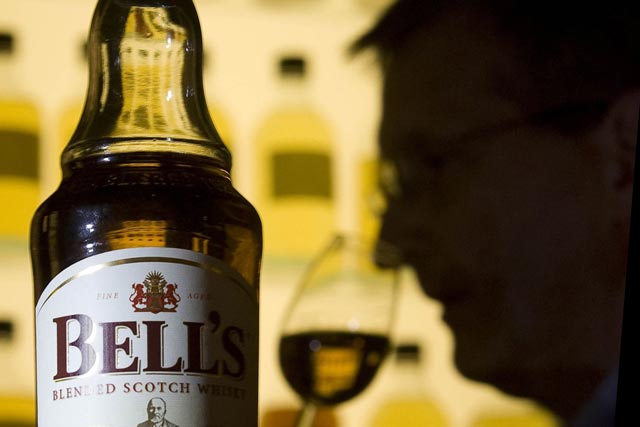
The company made profits of £1.7bn, with sales up 4% to £5.3bn.
It flagged better trading in Latin America, Africa and Asia, which helped counter weaker sales in Europe, where consumers' tastes are switching to cheaper alternatives.
In Europe, Diageo said, Great Britain recorded an increase in sales of 1%, but "negative price/mix in spirits and the strong growth of wine led to margin erosion". Economic pressures in Greece, Iberia and to a lesser extent Ireland, led to a 13% net sales decline across the markets.
In Russia and Eastern Europe, net sales were up more than 20% as a "result of the improving economic situation and strong growth of imported spirits".
In the rest of Europe, a mixed performance resulted in a net sales decline of 1%.
The company said it had revised its marketing spend in relation to how markets performed.
Marketing spend in Greece and Iberia decreased 21%, spend in Russia and Eastern Europe increased over 50%, while spend in the rest of Europe rose slightly, focused on "strategic brands".
The US market was led by growth in the spirits category, which led to a growth in marketing spend of 12%, with further increases in investment behind strategic spirits brands.
In Latin America and the Caribbean, the strong performance of Scotch whisky brands delivered double-digit volume growth, according to the company, while in Africa, the continued strong performance of beer in East Africa, Nigeria and Cameroon and the growth of Scotch in South Africa, drove a net sales growth of 10%.
In the Asia Pacific region there was double-digit growth in Scotch, extending Diageo's position as the leading Scotch company in Asia. The emerging markets in Asia grew net sales by 15%.
Paul Walsh, chief executive of Diageo, said: "We have increased marketing spend significantly, up 10%, but in a very focused way. Despite the economic weakness in much of Europe, our first-half performance gives me increased confidence that we will improve on the organic operating profit growth we delivered in fiscal 2010".


.jpg)


.jpg)